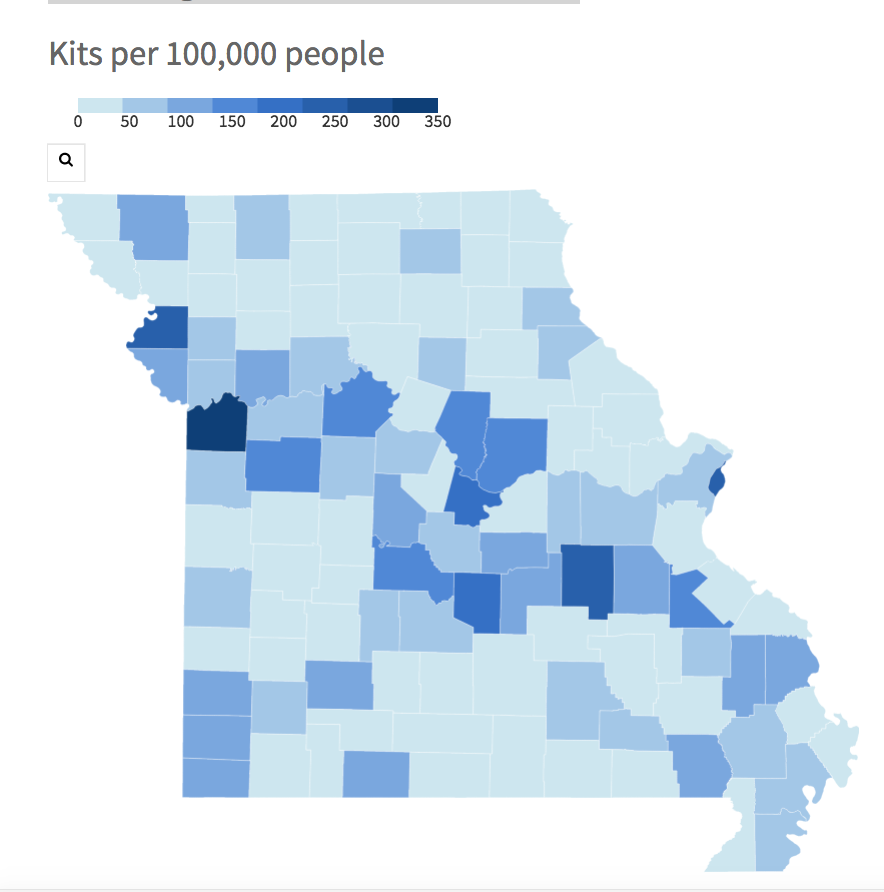We have failed survivors of sexual assault,” said Matthew Huffman, spokesman for Missouri Coalition Against Domestic and Sexual Violence.
November 30, 2019
Jackson County has the highest number of untested sexual assault kits in the state, with more than 2,300 kits stored at area police departments and health facilities, a report from the Missouri attorney general’s office said.
The report identified a total of 6,157 kits across the state that were collected before April 30, 2018, but had never been tested.
Another 830 kits that could be retested using newer technology were also identified
“This inventory and the results that came out of it show us that as a state, we have failed survivors of sexual assault,” said Matthew Huffman, spokesman for Missouri Coalition Against Domestic and Sexual Violence.
Huffman said Missouri needs to standardize the process for collecting and storing kits.
A lack of training, resources and best practices are to blame for the backlog, said Chris Nuelle, spokesman for the Missouri attorney general’s office.
In 2015, a nationwide effort began to count and test thousands of kits sitting in police property rooms. The Missouri attorney general’s office initiated its review two years ago, conducting a preliminary count.
The office received a federal grant last year allowing it to form a working group and in February, analysts began the comprehensive statewide count. The inventory included 631 law enforcement agencies, 193 health care providers and four other organizations.
A police report accompanied 75% of the untested kits, known as reported kits. Evidence from kits in which a police report was not filed, known as unreported kits, should not be tested unless the person consents, the attorney general’s office said.
That’s considered a best practice in the field.
“It’s really crucial to survivors’ healing and well-being that we follow their choices about what they want to do,” said Ilse Knecht, director of policy and advocacy at the Joyful Heart Foundation, whose mission is to transform society’s response to sexual assault and support survivors.
Knecht encouraged Missouri to mandate testing of reported kits, as 31 states have already done. With that, she said, also comes the need for additional funding.
Untested rape kits in Missouri
More than 6,000 untested sexual assault kits were identified during a statewide inventory. Twenty-seven counties reported zero untested kits while Jackson County had the highest rate at 338.1 per 100,000 people. Across the U.S., more than 47,000 kits have been tested resulting in 7,000 DNA matches.
The report showed that the Kansas City Police Department had the most untested kits of any agency with 1,404. But 537 were considered unreported kits.
“Unlike many other jurisdictions, KCPD recovers and keeps all rape kits collected at local hospitals, even if the victim does not make a police report at the time,” said Sgt. Jacob Becchina, a spokesman for the department.
“If, in the course of their healing, they decide they do want to move toward prosecution of the offenders, they can request that their kits be tested.”
More than 830 kits had police reports. “A majority of the cases did not go forward due to the lack of victim follow up,” said Capt. Tim Hernandez, a spokesman for the department.
Victims refused to go forward with an investigation, provided inaccurate contact information or didn’t return calls from detectives, he said.
KCPD has its own crime lab. Hernandez said it would cost $561,000 to test the reported kits.
The attorney general’s office said it has grant funding to test 1,250 of the state’s kits and plans to seek additional funds.
The results will be uploaded to a national database containing DNA profiles from offenders.
Across the U.S., more than 47,000 kits have been tested, resulting in 7,000 DNA matches since 2015.
Kansas underwent a similar initiative starting in 2014 and 2,200 kits were identified. Testing was completed on them the first week of November, according to the Kansas Bureau of Investigation.
Read more here: https://www.kansascity.com/news/local/crime/article237596634.html#storylink=cpy


